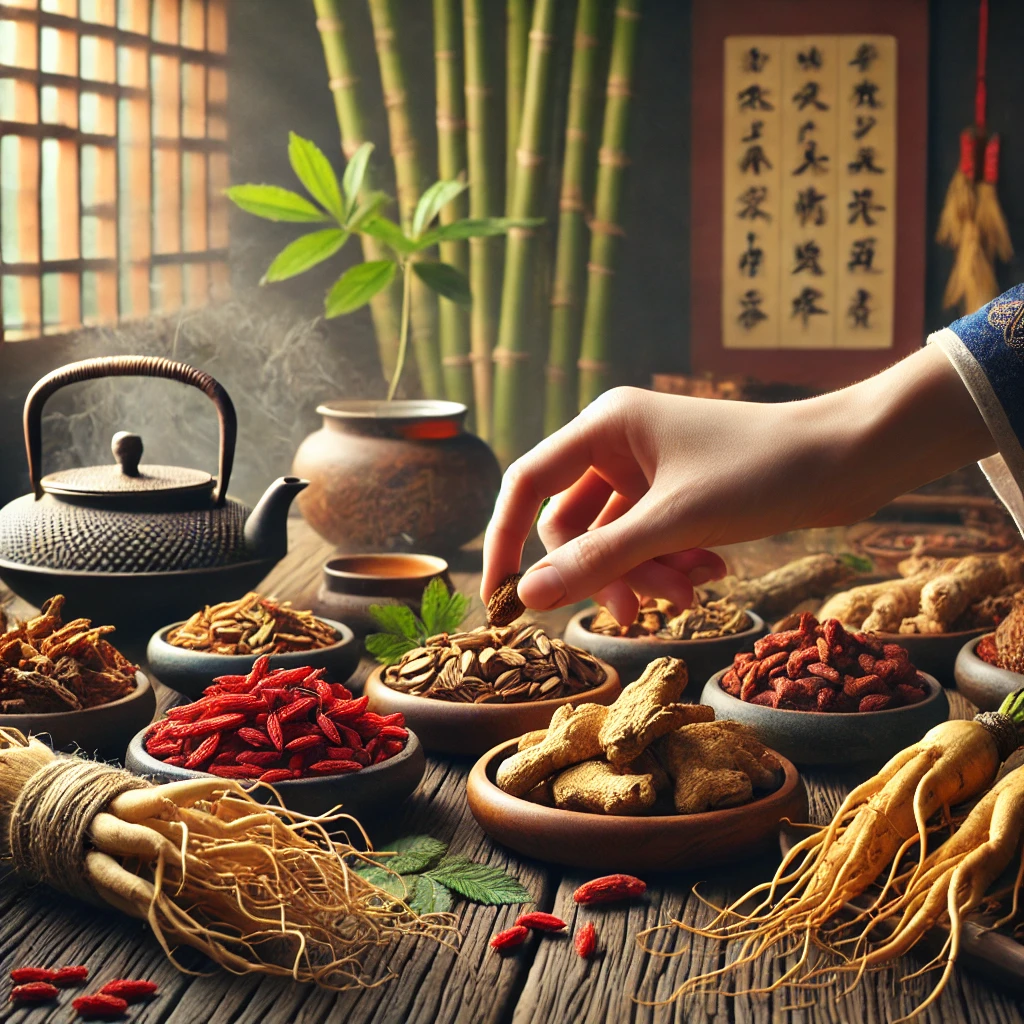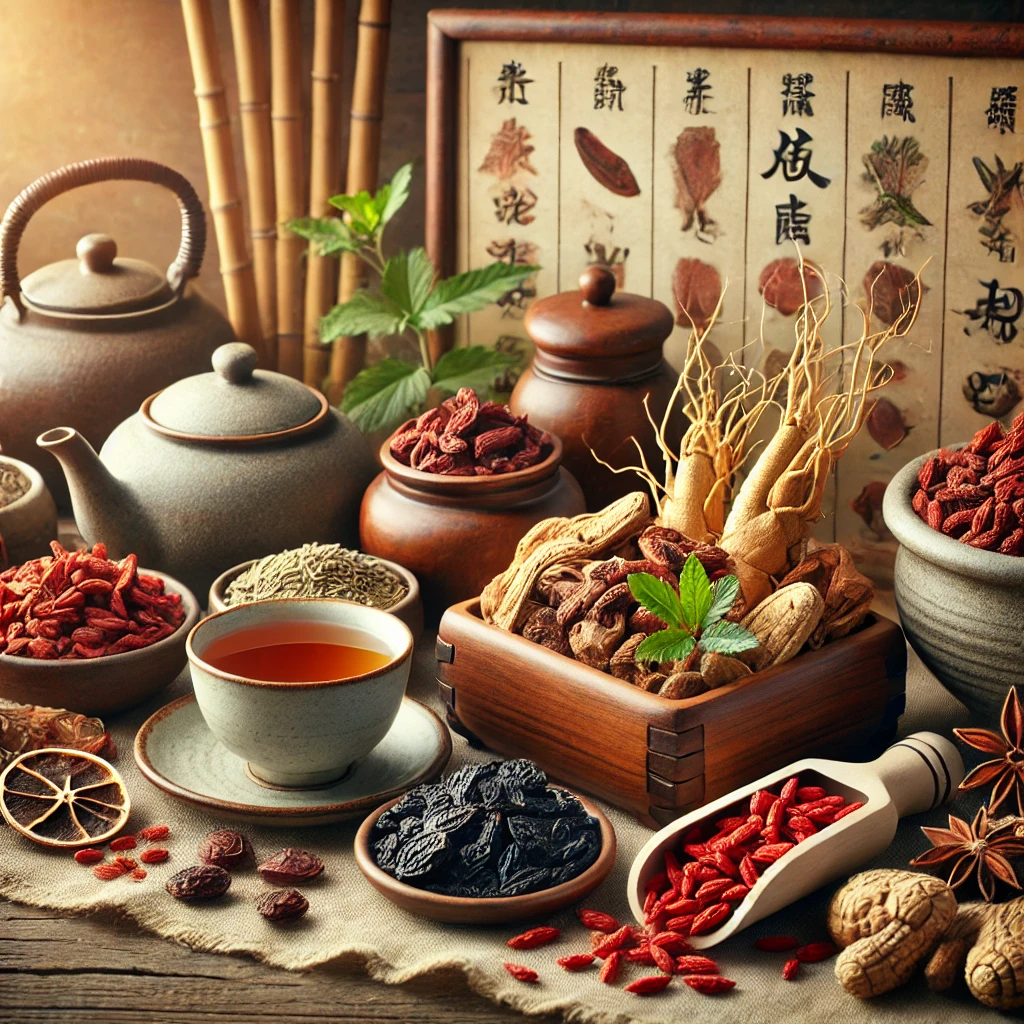Table of Contents
Introduction to Chinese Herbal Medicine
Chinese herbal medicine represents a pivotal component of traditional Chinese medicine (TCM), dating back thousands of years. Rooted in ancient philosophies, this practice integrates principles of balance, harmony, and the interconnectedness of the body, mind, and environment. The historical foundations of Chinese herbal medicine can be traced to seminal texts, such as the “Huangdi Neijing” (The Yellow Emperor’s Inner Canon), which emphasizes the significance of health promotion and disease prevention through natural remedies.
At the heart of TCM lies the concept of Qi (or vital energy), which flows within the body along meridians. According to this philosophy, health is maintained when Qi is in harmony, while illness arises from its stagnation or imbalance. Thus, the use of various herbs in Chinese medicine aims to restore balance, enhance Qi, and cultivate overall well-being. Each herb is believed to possess unique properties, working synergistically to promote health and alleviate ailments.

Contrasting the approaches of Chinese herbal medicine with Western medical practices underscores a significant philosophical difference. While Western medicine tends to focus on treating specific symptoms and employing synthetic pharmaceuticals, Chinese herbal medicine emphasizes holistic treatment. It seeks to understand the root causes of ailments, considering not only the physical symptoms but also emotional and lifestyle factors. This comprehensive perspective encourages patients to engage in proactive health management through natural herbs, fostering a deeper connection to their bodies and the environment.
In this artful practice, herbs like ginseng and goji berries are renowned for their health benefits, serving as prime examples of how natural ingredients are utilized to enhance vitality and wellness. Overall, the adoption of Chinese herbal medicine reflects a growing trend toward embracing holistic and natural health solutions in contemporary society.
Understanding Ginseng: The King of Herbs
Ginseng, often referred to as “the king of herbs,” is renowned for its extensive use in Traditional Chinese Medicine (TCM) and has garnered attention in various cultures for its health-promoting properties. The two most recognized types of ginseng are Asian ginseng (Panax ginseng) and American ginseng (Panax quinquefolius), each offering distinct health benefits and applications.
Asian ginseng is celebrated for its stimulating effects, making it particularly sought after for enhancing energy levels and countering fatigue. The root is rich in ginsenosides, a group of compounds believed to unleash a variety of physiological benefits. Studies have suggested that Asian ginseng may improve physical performance and bolster athletic endurance. Its effects on energy are often linked to improved blood circulation, which can increase oxygen delivery to the muscles during exertion.

On the other hand, American ginseng is typically classified as a more calming variant, making it suitable for situations where stress management is paramount. It is often utilized to support immune function, particularly during cold and flu season. Some research indicates that this type of ginseng may reduce the duration and severity of respiratory illnesses. American ginseng’s adaptogenic properties help an individual better respond to stress, promoting overall well-being and resilience.
Furthermore, both types of ginseng have gained traction in studies focused on cognitive function. Research shows that ginseng may enhance mental clarity and improve memory, thereby improving cognitive performance. These effects can be particularly beneficial for individuals experiencing mental fatigue or those engaged in demanding intellectual tasks.
Ginseng’s esteemed standing in herbal medicine is supported by a growing body of scientific research, affirming its transformative effects on health and wellness. The incorporation of ginseng into daily routines has the potential to support physical vitality, bolster immunity, and enhance mental function, truly encompassing its status as a treasured herbal remedy.
Goji Berries: The Superfood of Ancient Wisdom
Goji berries, known scientifically as Lycium barbarum, have been an integral part of traditional Chinese medicine for over 2,000 years. These vibrant red berries are not just a modern superfood trend; they hold a rich historical significance, symbolizing health, longevity, and vitality in ancient Chinese culture. Revered for their medicinal properties, goji berries were believed to nourish the liver and kidneys, vital organs in Traditional Chinese Medicine (TCM). They have been referenced in various herbal texts and are often considered a tonic for enhancing overall wellbeing.

The health benefits attributed to goji berries are numerous. These nutrient-dense fruits are packed with antioxidants, vitamins, and minerals, contributing to their status as a superfood. They are particularly noted for their role in promoting longevity, with historical accounts suggesting that the consumption of goji berries among the elderly in rural communities has been linked to their remarkable lifespan. Moreover, goji berries are recognized for their ability to improve eyesight; they are rich in zeaxanthin, a carotenoid that supports eye health and helps reduce the risk of age-related vision problems.
Additionally, goji berries are known to support immune health by enhancing the body’s natural defense mechanisms. Their rich nutrient profile aids in increasing energy levels and managing stress, making them a valuable addition to a balanced diet. Incorporating goji berries into modern diets can be achieved easily. They can be enjoyed in various forms, such as dried snacks, infused in teas, blended in smoothies, or added to oatmeal and salads. Their sweet and slightly tart flavor enhances numerous dishes while providing a nutritious boost, making them a versatile superfood option in today’s health-conscious culinary landscape.
Other Key Herbs in Chinese Medicine
In addition to ginseng and goji berries, there exists a multitude of herbs that play significant roles in traditional Chinese medicine (TCM). Among these, astragalus, reishi mushrooms, and chrysanthemum are particularly noteworthy for their unique contributions to health and wellness.
Astragalus, also known as Huang Qi, is revered in TCM for its immunomodulatory properties. This herb is often used to help bolster the immune system, decrease the frequency of colds and flu, and enhance overall vitality. It is rich in polysaccharides and saponins, which are believed to aid in energy production and improve the body’s natural resistance to illness. Furthermore, astragalus is frequently incorporated into herbal formulations designed to support the spleen, a vital organ in TCM associated with digestion and energy production.
Reishi mushroom, or Ganoderma lucidum, is another key herb that has garnered attention for its extensive health benefits. Often referred to as the “mushroom of immortality,” reishi has adaptogenic properties, helping the body manage stress and maintain balance. Its bioactive compounds—like triterpenes—are reported to improve sleep quality, support cardiovascular health, and enhance mental clarity. In TCM, reishi is commonly used to promote Qi (vital energy) circulation, which is essential for maintaining harmony within the body.
Chrysanthemum, or Ju Hua, is another essential herb used in TCM, known for its cooling properties. It has traditionally been employed to ameliorate conditions characterized by heat, such as fevers or sore throats. Additionally, chrysanthemum tea is often enjoyed for its potential to promote eye health, alleviating symptoms of dryness and fatigue. The flowers are rich in flavonoids and antioxidants, which further contribute to their healthful effects.
Each of these herbs—astragalus, reishi, and chrysanthemum—embodies unique characteristics and benefits that complement the traditional practices of Chinese herbal medicine, helping individuals achieve a state of better health and well-being.
The Principles of Herbal Formulation
Chinese herbal medicine operates on a comprehensive framework that emphasizes balance and harmony within the body. This framework is predominantly guided by the concepts of yin and yang, as well as the five elements theory, which serve as the cornerstone for formulating effective herbal remedies. Yin represents qualities such as coolness and moisture, while yang signifies heat and activity. The successful application of herbal medicine involves adjusting these opposing forces to create a state of equilibrium, essential for optimal health.
The five elements—wood, fire, earth, metal, and water—are interrelated and reflect various physiological and psychological states. Each element corresponds to specific organs, tissues, and emotions, allowing practitioners to understand complex health issues more deeply. For instance, wood is associated with the liver and anger, while water corresponds to the kidneys and fear. By recognizing which elements are out of balance in an individual, herbalists may tailor their prescriptions to address these discrepancies. This holistic approach not only targets physical symptoms but also promotes emotional and mental well-being.
When formulating herbal remedies, practitioners carefully select a combination of herbs to achieve specific therapeutic goals. The balance of herbs requires consideration of their properties—whether they are warm, cool, dry, or moist—and their interactions with one another. A well-crafted formula may consist of a primary herb that addresses the main ailments, complemented by secondary herbs that support and enhance its effects, while other herbs may serve to harmonize the blend or eliminate any potential side effects.
Furthermore, practitioners often customize treatments based on an individual’s constitution, which may include factors such as age, gender, lifestyle, and existing health conditions. By doing so, they ensure that the herbal remedies are not only effective but also tailored to the unique needs of each patient, laying the groundwork for a successful healing journey.
Safety and Precautions in Using Herbal Remedies
When incorporating Chinese herbal medicines into one’s health regimen, safety and precaution should be paramount. Although herbs such as ginseng and goji are widely recognized for their therapeutic benefits, it is essential to be aware of potential interactions with conventional medications. Many herbal remedies can interact with prescriptions critical to managing various health conditions. For example, certain herbal ingredients may amplify or mitigate the effects of blood thinners, antidepressants, or medications for diabetes, which could lead to unintended consequences.
Understanding appropriate dosages is another crucial aspect of utilizing herbal medicines effectively. Unlike pharmaceutical drugs, dosage recommendations for herbal remedies can vary widely based on individual characteristics such as age, sex, and overall health. Therefore, consulting reliable sources or healthcare professionals is advisable before commencing any herbal treatment. Misuse or excessive consumption may lead to adverse effects, compromising the apparent benefits these natural substances offer.
Sourcing high-quality herbs is equally important to ensure their effectiveness and safety. It is recommended to purchase herbal products from reputable suppliers who adhere to good manufacturing practices and provide transparent information about their sourcing. Some lower-quality products may contain contaminants or be mislabelled, which could diminish their intended health effects or result in harmful reactions.
Lastly, it is imperative to seek guidance from a qualified healthcare professional before starting any herbal regimen, particularly for individuals with underlying medical conditions, pregnant or nursing women, and those who are currently taking other medications. A healthcare provider with a comprehensive understanding of both conventional and herbal medicine can help navigate these considerations, ensuring a safe and beneficial experience with herbal remedies.
Integrating Chinese Herbal Medicine with Modern Practices
Chinese herbal medicine has garnered increasing attention in recent years as a complementary approach to modern medical practices. This form of traditional medicine employs a diverse array of natural ingredients, such as ginseng and goji berries, which are believed to offer various health benefits. As the healthcare landscape evolves, many practitioners are recognizing the importance of an integrative model that combines the strengths of both traditional and contemporary medicine.
One notable aspect of this integration is the use of herbal remedies alongside conventional treatments for chronic conditions. For example, patients suffering from stress-related disorders have found relief through the combination of prescribed medications and lifestyle modifications, supplemented by herbal interventions such as adaptogenic herbs. This form of synergy promotes a holistic approach to health, addressing not just the symptoms, but also the underlying causes.
Case studies underscore the potential benefits that arise from these integrative practices. In one instance, patients undergoing chemotherapy incorporated herbal supplements into their treatment regimen. The combination was associated with reduced side effects and improved overall well-being. Such outcomes highlight the potential of ginseng and similar herbs to support recovery and enhance quality of life during challenging medical interventions.
The growing popularity of herbal medicine is reflected in numerous integrative health clinics that offer combined therapies, where patients can consult with professionals skilled in both fields. This multidisciplinary approach allows for personalized treatment plans, fostering better communication between practitioners and providing patients with a wider array of options for managing their health concerns.
As the dialogue between Eastern and Western medicine continues to evolve, the integration of Chinese herbal medicine into modern practices presents a promising frontier. By acknowledging and respecting the contributions of each discipline, healthcare providers can create comprehensive treatment strategies that honor the wellness of the individual.
Cultural Significance of Herbs in Chinese Society
The use of herbs in Chinese society extends beyond mere medicinal benefits, as it is deeply intertwined with cultural values and practices that have evolved over thousands of years. Traditional Chinese Medicine (TCM) employs a holistic approach that sees health as a balance of vital energies, which is often cultivated through the use of various herbs. Among these, ginseng and goji berries are renowned for their purported properties of boosting energy and improving overall wellness, making them integral to both historical and contemporary health practices.
Historically, Chinese herbal medicine has been prominently featured in rituals and festivals, with herbs often offered to ancestral spirits as a means of honoring them. This reverence for nature and its healing properties reflects a broader philosophical worldview, emphasizing harmony between humans and the environment. Not only are these herbs celebrated for their health benefits, but they are also symbols of longevity, prosperity, and resilience. The cultural significance of these practices has persisted through generations, informing a modern approach to health that is rooted in age-old wisdom.
The preservation of ancient herbal traditions in Chinese medicine serves as a testament to their enduring significance. As people seek natural alternatives to pharmaceuticals, the cultural roots of herbs such as ginseng and goji continue to thrive, nurturing a global appreciation for holistic health practices.
Conclusion: Embracing the Wisdom of Nature
Throughout this exploration of Chinese herbal medicine, we have highlighted the significant benefits of herbal remedies such as ginseng and goji berries, among others. These natural components not only hold historical importance but are also valued in modern health practices for their unique properties and therapeutic effects. Chinese herbal medicine emphasizes a holistic approach, focusing on the balance and harmony of the body and mind. By using these natural remedies, individuals can support their overall well-being, enhance vitality, and ultimately achieve a healthier lifestyle.
The efficacy of these herbal remedies is rooted in centuries of tradition and knowledge, underscoring the relevance of Traditional Chinese Medicine (TCM) in contemporary times. In our fast-paced world, where stress and unhealthy lifestyles are pervasive, the wisdom of nature becomes increasingly important. The integration of herbal medicine into daily routines can serve as a practical solution for promoting wellness and preventing disease. Adopting TCM principles encourages individuals to recognize the natural world’s gifts and make informed choices about their health choices.

Moreover, the use of herbs such as ginseng and goji enriches the body with potent nutrients, assisting in functions such as immune support and energy enhancement. This provides a gentle reminder of the interconnectedness between humans and nature. By embracing the wisdom of nature encapsulated in these time-honored practices, individuals can cultivate a deeper appreciation for holistic health strategies. In conclusion, exploring the realm of Chinese herbal medicine not only offers potential health benefits but also reinforces the importance of respecting and harmonizing with the natural world.





